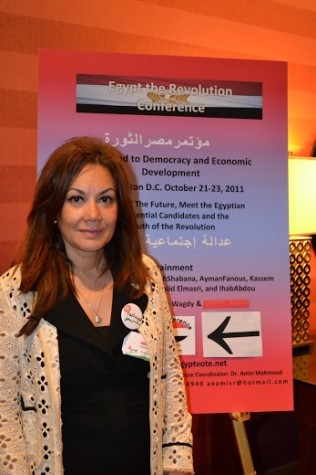
Since the region of Cleopatra in the year 51 B.C., no woman has attempted to become the ruler of Egypt. Bothaina Kamel, a former controversial talk-show host on Egyptian radio and television, could not gather enough signatures for her first run in 2011. This time, she has the signatures and will try again.
When I met Ms. Kamel at the Egyptian Revolution Conference in Washington, D.C. in October of 2011, I asked her if she had any hope of becoming Egypt’s next president. Her answer was a forceful “no.” Known for her controversial positions calling for equality for all religious minorities, and the establishment of a minimum and a maximum wage, Ms. Kamel said that she did not expect women to turn out in large numbers because of the security situation, which is not much better today.
Ms. Kamel was running, primarily, to change the culture, which she believes is oppressive to women. She and other women have been subjected to sexual harassment and assaults for simply participating in street protests over the years. She is also running to keep the revolution alive.
“People in Egypt are now beyond the shock of a woman running [for president],” she said, adding that she wanted to appeal to Egypt’s youth. The new generation, she said, is more accepting of gender and age differences, and that most of the support she had in Egypt “comes from young people.” She wants to reduce the age of candidates running for parliament from 30 to 22 so that the youth of the revolution can participate in elections.
Kamel had hosted a television program in Egypt during the Mubarak era and was fired when she began to delve into social issues such as sexual harassment, domestic violence and female circumcision.
Ms. Kamel has been critical of the Egyptian military and its role in allowing thousands of militant Islamists to return to Egypt after Mubarak’s fall. She has accused the military of failing to prevent attacks on women, and she has condemned the army’s assault on Coptic Christians in October of 2011. Coptics were attacked in Maspero, Cairo by army personnel and armored vehicles, resulting in 24 deaths and injuries to over 200 individuals.
The final list of presidential candidates for the 2014 election will be announced on May 2. A poll conducted by the Egyptian Center for Public Opinion Research, Baseera, found that if the election was held at the end of March of this year, 39% would have voted for El Sisi, only 2% would have voted for other candidates and 59% would have been undecided.
Field Marshall Abdel-Fattah El-Sisi, who is the leader of the Egyptian military, is widely expected to win.







